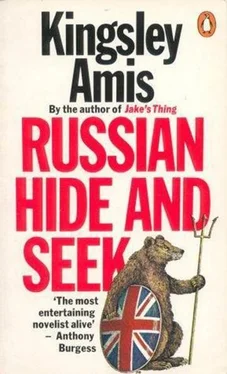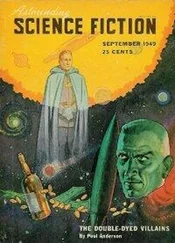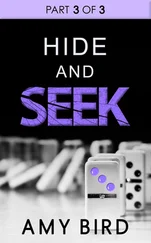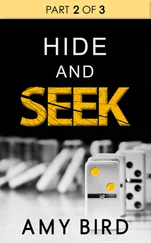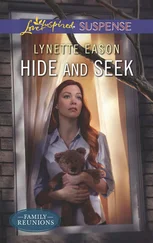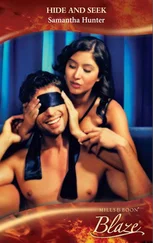Kingsley Amis - Russian Hide-and-Seek
Здесь есть возможность читать онлайн «Kingsley Amis - Russian Hide-and-Seek» весь текст электронной книги совершенно бесплатно (целиком полную версию без сокращений). В некоторых случаях можно слушать аудио, скачать через торрент в формате fb2 и присутствует краткое содержание. Жанр: Современная проза, на английском языке. Описание произведения, (предисловие) а так же отзывы посетителей доступны на портале библиотеки ЛибКат.
- Название:Russian Hide-and-Seek
- Автор:
- Жанр:
- Год:неизвестен
- ISBN:нет данных
- Рейтинг книги:3 / 5. Голосов: 1
-
Избранное:Добавить в избранное
- Отзывы:
-
Ваша оценка:
- 60
- 1
- 2
- 3
- 4
- 5
Russian Hide-and-Seek: краткое содержание, описание и аннотация
Предлагаем к чтению аннотацию, описание, краткое содержание или предисловие (зависит от того, что написал сам автор книги «Russian Hide-and-Seek»). Если вы не нашли необходимую информацию о книге — напишите в комментариях, мы постараемся отыскать её.
A handsome and highly sexed young Russian cavalry officer, Alexander Petrovsky, joins the plot and learns to his regret that politics and playmates don't mix.
"Funny, cynical, captivating-Amis makes an implausible situation almost believable, then lets his characters worry their way out." (B-O-T Editorial Review Board)
Russian Hide-and-Seek — читать онлайн бесплатно полную книгу (весь текст) целиком
Ниже представлен текст книги, разбитый по страницам. Система сохранения места последней прочитанной страницы, позволяет с удобством читать онлайн бесплатно книгу «Russian Hide-and-Seek», без необходимости каждый раз заново искать на чём Вы остановились. Поставьте закладку, и сможете в любой момент перейти на страницу, на которой закончили чтение.
Интервал:
Закладка:
The two had made a sufficient gap and were remounted and through it and away before Alexander reached the spot. It was time to put on the pace again, but that would not be easy in the bushy stretch in front of him; there would be no more races for a spell. After a few minutes’ frustrating work he found his way clearing and soon reached the edge of a field of wheat. S-S D or another had been through it fifty metres or more to his left, but despite the consequent loss of time he followed in their track so as to limit the damage done to crops to what was strictly necessary. There were horsemen ahead of him now, two groups crossing a strip of pasture where cows drew together in alarm. He followed at a full gallop, came to a hedge as high as any he remembered having jumped, sat tight in the saddle, pressed his knees in and pushed his hands and heels down and landed awkwardly but safely in a vacant space with buildings on two sides, turned a corner through a gateway and found himself in a farmyard among rearing mules, fluttering chickens and swearing English; somebody snatched a child out of his path. Then he was through and in the open again.
The church was four hundred metres away at the top of a steep slope up which S-S A – as it proved to be – was struggling; no others were to be seen. This race was too easy:
Alexander dismounted at the foot of the steeple, complimented Polly on her speed and agility and was perched on a gravestone smoking a cigarette when the two men and their four horses came clattering into the churchyard. All showed signs of exertion, but of some complacency too, the men with broad smiles, the horses hardly blowing, shaking their heads about.
‘Best of a bad lot for once,’ said Alexander airily.
The corporal, a tall melancholy-looking lad by the name of Lyubimov, gave a chuckle; he had dismounted and run up his stirrups and was loosening his charges’ girths. ‘For once, your honour? This makes the third time out of four that Lomov and I have nearly strolled in ahead of you and that cart-horse of yours.’
‘Of course, we know that Polly has a great burden to bear,’ said little Lomov, accurately gauging his officer’s mood.
‘Fortunately for you I choose to ignore that, Lomov. As for you, Lyubimov, you may well be right with your statistics, which seem to be unimpressive in any case. Only three times out of four? Surely, as befits its seniority, Sub-Section A must come first every time. And where’s S-S B, which I remind you is part of your command, Corporal Lyubimov? Oh well, let’s ignore that too. And now, to stop you standing there with your palms itching and your tongues hanging out, let me recognise the only motive that has made you exert yourselves and your wretched hacks this afternoon and satisfy your greed.’ Alexander took out his wallet. ‘For you, Lyubimov, a munificent £10,000’ – the two notes were accepted with a bow – and £5,000 for Lomov as befits his even lowlier station. And well done, the pair of you. Good work.’ It would have taken two much less elated soldiers than these to find anything wrong with the way some of the foregoing had been said.
Presently there were men and horses everywhere. Warsky, the artificer-sergeant, arrived last. He reported that he had seen S-S E using a road. The sub-section corporal contended that he had merely crossed one at an angle. At this trivial dissension all Alexander’s good-humour departed. He announced snappishly that he would decide the matter at troop office the following morning, warned Ulmanis to make ready to move off in ten minutes and strolled over to the church door. Here a bilingual notice told of hours of business; the present moment lay within them. He could not remember having been this way before and had no idea of the nature of the business conducted, meat- or vegetable-market, communal eating-rooms, laundry or, as was most common, administrative offices. No signboard was to be seen: the old English hostility to strangers, he thought to himself, still going after all these years. Out of curiosity he decided to take a quick peep inside; he might even be able to get a drink.
He pushed at the heavy door and immediately heard an organ quietly playing a scale, a voice raised in exhortatory style and the murmur of a sizeable assembly. It was not what he had expected. In the small vestibule inside there stood a table with four or five identical books on it. He glanced at one and read without comprehension the words The Book of Common Prayer. Advancing further into the building he saw that the organ, elevated above the inner doorway, was being tested or altered or was perhaps still under construction. The voice he had heard was finishing a short speech about the necessity of consulting its owner on certain points, and the assembly, now seen to be after all not large, was very active, though what it was doing was not at once clear to Alexander, nor did he come to understand those doings in more than outline in the short time he stayed. He had evidently entered during an imposed silence, or comparative silence, which abruptly ended in an uproar of hammering, sawing and the whining of old-fashioned drills as he moved into the middle of things. Everywhere there were metre-square copies of the same photograph; it showed a large interior, but he had still not identified this when the man who had spoken, a Russian, clearly a supervisor of some sort, noticed the uniform, it seemed with no great relish, and hurried over. His companion, white-haired, round-backed, clearly a pre-war, gave a sideways look and turned away.
‘Is there anything wrong, sir?’ asked the supervisor. He was about fifty, pale, wearing a grey overall.
‘Not as far as I know. What’s going on here?’
‘Going on, sir? Why, we’re beginning to put the things into place. You should have seen it when we started. Those stairs up to the pulpit - this would be easier in English, sir, if you-’
“Easy for you not same as… Alexander reflected belatedly that here was a person of no account, and started again, It might well be for you, but it certainly wouldn’t be for me. Now you haven’t told me the purpose of all this.’
The man gave a frown of exasperating puzzlement. ‘The purpose? We’re restoring the church, sir. That’s to say, we’re putting it back like it used to be, before it was an ironmongery. So that when-’
‘Yes yes, of course, but… what are those men there doing?’
‘They’re building the, the places for the choir to be, sir.’
‘Just so. And that basin there?’
‘That’s the font, sir.’ Just in time to save his front teeth, the supervisor went on, ‘For the holy water, sir.’
‘Good,’ said Alexander, sounding relieved that these important details had not been overlooked. ‘And this, I take it, is how it was originally.’
‘Correct, your honour. In 1983, as you see. It had been out of use for some years before then, but not yet deconsecrated.’
‘No.’ How strange it looked, as if it had been the product of a different civilisation, showing nothing at all that could be paralleled in the surviving theatres or other public halls of those times. Even those features with an identifiable function, like the rows of benches where the audience must have sat, seemed almost perversely odd in their design. Perhaps that design could be traced to the Eastern origins of Christianity, but if so all the other progeny of that stock, if any, must have died out. As this one had. Once, as a small boy, Alexander had been taken into a church in Sevastopol, and he thought he remembered now that he had experienced the very same sense of the alien, almost the inhuman. And yet there had been something about what had been here, and in innumerable other such places, that men had been ready to die for – long ago, as Mets had said. Whatever it had been, it must have changed remarkably over the years.
Читать дальшеИнтервал:
Закладка:
Похожие книги на «Russian Hide-and-Seek»
Представляем Вашему вниманию похожие книги на «Russian Hide-and-Seek» списком для выбора. Мы отобрали схожую по названию и смыслу литературу в надежде предоставить читателям больше вариантов отыскать новые, интересные, ещё непрочитанные произведения.
Обсуждение, отзывы о книге «Russian Hide-and-Seek» и просто собственные мнения читателей. Оставьте ваши комментарии, напишите, что Вы думаете о произведении, его смысле или главных героях. Укажите что конкретно понравилось, а что нет, и почему Вы так считаете.
